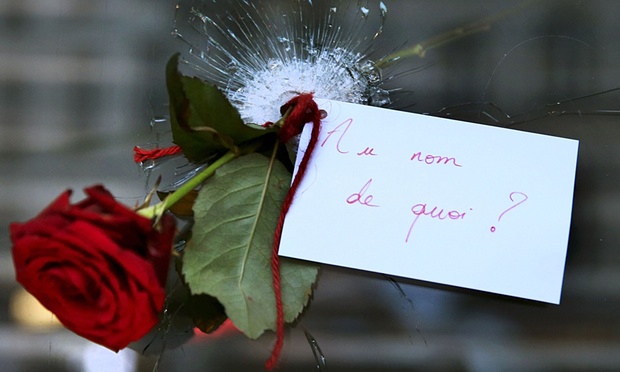World unites to condemn terrorism after Paris attacks

A rose has been inserted through a bullet hole in the window of a Paris restaurant with a card that reads “In the name of what?” in French to honor the victims of the terrorist attacks on the evening of Nov. 13.
On the evening of Nov. 13, a series of terrorist attacks hit the Stade de France, the Bataclan theater and several restaurants in Paris. So far, more than 130 have died and more than 350 have been injured.
In a message to French President Francois Hollande, Chinese President Xi Jinping condemned in the strongest terms the attacks, offered his sympathy to the injured and expressed his condolences to those who lost loved ones. China always opposes all forms of terrorism and is willing to work with France and the international community to enhance cooperation in security, fight terrorism and ensure the safety of people in all countries, Xi said.
UN Secretary-General Ban Ki-moon, the UN Security Council and the European Union all issued statements saying the whole world is outraged by the attacks in Paris and will stand in solidarity with the French government and the people of France.
Why France again?
Earlier this year, France had already witnessed several attacks, including the shootings at the headquarters of satirical magazine Charlie Hebdo on Jan. 7, the beheading of a man on June 26 and the shooting on a train from Amsterdam to Paris on Aug. 21.
Daniel Byman, a professor in the School of Foreign Service at Georgetown University, said one reason France is being targeted is that in the 1990s, it began to get tough on terrorism. France is also an aggressive player in the Middle East. It joined the US–led bombing of ISIS and also intervened on its own. Another reason is, he added, that at home, France is also proudly secular. Its official policies are hostile to public displays of religion like the veiling of women, and satirical magazines like Charlie Hebdo regularly ridicule religions, including Islam.
Wang Chuan, a research fellow from the Knowfar Institute for Strategic and Defence Studies, said the fact that French intelligence agencies had no advance warning of the Paris attacks demonstrates that the reform of the intelligence system after the Charlie Hebdo attack has failed.
Influence on Europe
The Paris attacks are expected to have a lasting influence on the security policy and concepts of France and the EU. For a long time, Europe has focused on traditional security threats, and its security system has been ineffective at coping with internal attacks, said Gao Shangtao, director of the Research Center for Middle East Studies at China Foreign Affairs University, adding that in the future, France and the EU are likely to imitate the US by setting up anti-terrorist mechanisms and specifying measures of combating the Islamic State group.
Tian Dewen, a research fellow from the Institute of European Studies at the Chinese Academy of Social Sciences, said the Paris attacks will also complicate the refugee problem in Europe by making the EU agreement more difficult to implement. Shortly after the attacks, Poland withdrew its consent to the EU’s refugee quota plan, and other Central and Eastern European nations may follow suit, he said.
Emile Hokayem, a senior fellow for Middle East Security at the International Institute for Strategic Studies, said it is not a matter of capability, but strategy to address issues with the Islamic State group. “There is no doubt that military force needs to be used against ISIS, and it is a security and military problem. In addition, we need to break the ISIS narrative that is expanding. This is why force is an element but not the only element.”
The Institute’s Director-General and Chief Executive John Chipman said the fight against the Islamic State group will be a long-term strategic problem, but the international coalition against it is fragile. Strategies include cutting off its communication and supply, blocking its financial aid, striking it with precision, and training local forces for a more effective response. However, these will be inevitably hindered by “the absence of political solutions” to the wars in the Middle East.
Restoring regional peace
The increasing frequency of terrorist attacks despite the anti-terror efforts since 9/11 can be attributed to the failure of the Western anti-terror strategy led by the US, Gao said. The US has not explored ways to root out the sources of terror but has intervened militarily in Afghanistan, Iraq and Syria, which weakened their ability to govern society and combat terrorism, he said.
Chinese Foreign Minister Wang Yi pointed out that to uproot terrorism, we must remove its breeding ground. “To deny any haven to the specter of terrorism, we have to promote economic and social development, appropriately handle regional conflicts, and advocate equal-footed dialogue between different civilizations, religions and ethnic groups.”
Yao Xiaodan, Mao Li, Jiang Hong and Hou Li are reporters at the Chinese Social Sciences Today.

 PRINT
PRINT CLOSE
CLOSE